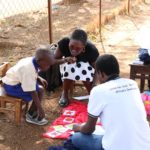Country
Year
Assignment
Partner
Theme
Scope of Final evaluation in Mali
To support the efforts of the Government of Mali to improve access to and use of basic health services throughout the country and to reduce the suffering of the population, International Medical Corps launched an intervention in Northern and Central Mali ». At the end of the two-year intervention, IMC commissioned an independent evaluation to determine the extent to which the program had achieved its intended results and induced significant changes. In addition, this is a descriptive and correlational cross-sectional study which aims to show the trends in the level of selected outcome indicators in the health and nutrition components, according to the program’s Indicator Tracking Table (ITT).
Methodology of Final evaluation in Mali
Armel Oguniyi, Senior Evaluator and Founder at ar-mel directed the research as the Lead Consultant. A mixed research method (quantitative and qualitative) was used for the evaluation: this type of research is relevant in that it enabled us to explore and study the opinions of different parties on the themes and issues of the final evaluation through a combination of quantitative and qualitative data from primary and secondary sources. The approach deployed is based on respect for fundamental human rights, and adapts to different cultures, participant specificities and local contexts.
Outcomes of Final evaluation in Mali
According to the data collected and analysed, the intervention contributed substantially to the relief of the hardships of communities affected by the crisis in security and growing precariousness, as several areas were targeted to meet the urgent needs of the target groups. The intervention was relevant and met the needs of the most vulnerable populations by strengthening their access to basic social services such as health, nutrition and GBV prevention and response. In the sector of nutrition, capacity-building, training, the provision of equipment and regular monitoring have helped to improve performance indicators in the project’s intervention zones.





